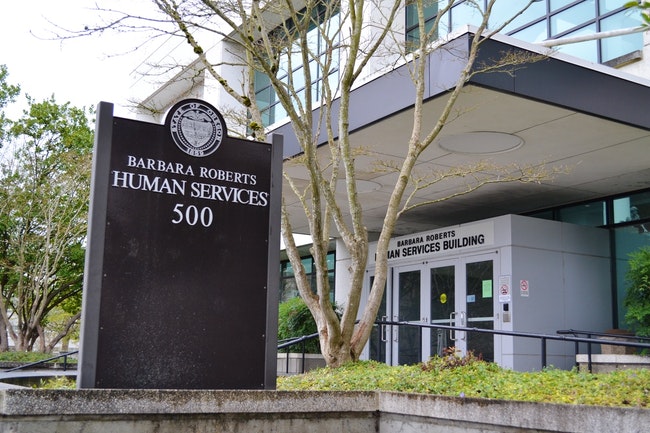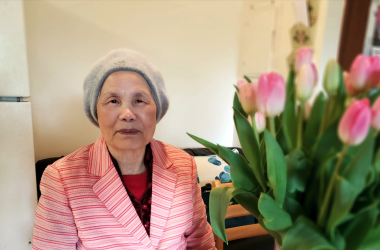
The state Department of Human Services (Courtesy/State of Oregon)
A majority of older lesbian, gay, bisexual Oregonians have experienced discrimination and many have been subjected to elder abuse, according to a survey commissioned by the Oregon Human Services Department.
The survey indicated that this population suffers from relatively high rates of poverty, suicidal thoughts and housing and economic instability. Many interviewed for the survey said they had difficulty getting health care or other social services such as food assistance and transportation because of the cost, availability or fears about their identity or qualifications.
The survey indicated that LGBTQ seniors in Oregon, an estimated 100,000 people, feel isolated and ignored. The survey, which involved online questionnaires and phone interviews with 1,400 lesbians, gays and bisexuals, considered anyone at least 55 years old as a senior.
“We still fall under all the things that happen to older adults,” said Mary Rita Hurley, a 62-year-old lesbian and cofounder of the LGBTQ Aging Coalition, an advocacy group. “Then on top of that, particularly depending on how old the older LGBTQ person is, there is still an amazing amount of stigma out there. We still have people in the closet.”
Hurley, who runs Our House of Portland, a residential care facility for people who are HIV positive, was one of the advocates who pushed the Human Services to commission the study.
Similar surveys have been conducted in Washington state and Massachusetts. This is the first comprehensive study of its type in Oregon.
On Wednesday, an advocate, Liz James, presented the findings to the Senate Interim Committee on Human Services, Mental Health and Recovery. A member of the LGBTQ Aging Coalition, she identified herself as a 66-year-old lesbian in the Rogue Valley who’s been out since she was 18.
“I’ve been chased and beaten up because of who I am,” James said. “I’ve lost many friends to the HIV epidemic,” she said.
She ran through the highlights of the report, clicking through slides:
-54% of participants had unmet social service needs
-33% had difficulty paying their bills
-20% reported having a poor quality of life
-21% did not reveal their sexual orientation to their providers
-21% said they had suicidal thoughts in the past year
-24% said they had experienced elder abuse in the past year
-40% reported living at or below the federal poverty line, an annual income of $12,800 for one person
-64% are not confident that they will be able to continue living in their current homes
“This is pretty stunning,” James noted.
Lawmakers on the committee agreed.
Sen. Bill Kennemer, R-Canby, said the survey turned up “alarming and concerning data,” and Sen. Kate Lieber, D-Beaverton, who’s the first openly lesbian member of the Oregon Senate, said this is “an incredibly important topic.”
She said she’d support any relevant bills.
“I’d love to partner in any other legislation to really push this forward,” Lieber said.
Findings called surprising and distressing
The survey has been at least three years in the making, with Hurley and gerontologist, Kathleen Sullivan, making a presentation to the Governor’s Commission on Senior Services in 2018. They were both members, and Hurley is now the chair.
The commission also wrote to Gov. Kate Brown, who identifies as bisexual, and advocates lobbied the Human Services Department.
Jane-ellen Weidanz, an administrator in the department, said state officials have attended coalition meetings and have had longstanding relationships with the community. When the survey idea popped up, the state was already looking for ways to collect such information by altering its data systems, she said.“The survey was just one step in that process,” Weidanz said.
The department commissioned the report in January from an institute at the University of Washington, led by Karen Fredriksen Goldsen, who studies marginalized groups. She conducted a similar survey on Washington state a few years ago and recently won federal funding to extend to 15 years the first nationwide study of lesbian, gay, bisexual, transgender older adults. In Oregon, based on her work, she estimates that about 7% of Oregonians 55 and over are LGBTQ+, or about 100,000 people.
“It’s a growing population that deserves attention by the area agencies on aging and the state of Oregon,” Fredriksen Goldsen said. “They’re a high needs group that’s often invisible. People don’t even realize they exist.”
Though some of the findings were expected, she was surprised by the high percentage of people who don’t report elder abuse – 76%.
“Not feeling safe to report – that’s really serious,” Fredriksen Goldsen said.
Weidanz found that statistic “really, really distressing.”
Weidanz was also surprised by the percentage of people living alone. More than one-third live alone and nearly one-fifth said they lack social support, the study showed.
“If you have a segment of our community, our state that doesn’t have that natural support woven into their life, what does that mean for us as a system?” Weidanz remarked.
One area of hope
Not all LBGTQ+ seniors are isolated. The survey showed that the community has a high level of resilience and is engaged in the community.
More than 70% said they have three or more people they can count on for social and emotional support; more than 40% attend faith, spiritual or religious services; and nearly 80% are involved in helping others in their community.
The survey also found that the population adapted well after Covid-19 hit. Nearly 95% got vaccinated, and more than half learned to use new technology.Hurley welcomed the data, which didn’t surprise her. It gives advocates data to push for policy and program changes that take the community into account.
“We’ve been screaming about this for years,” Hurley said. “I am so happy that we finally have this in writing.”
She’s hopeful that the Human Services Department will enact changes.
“What was apparent to the state is that they have let this group down,” Hurley said. “That was good for us.”
The Human Services Department is asking what “systems and supports” it can put in place to lessen the isolation of individuals in the community, Weidanz said. She said the state also needs to look at how it can help the community feel safe reporting abuse.
“That’s another thing I think we immediately need to address,” Weidanz said
The department is also looking at potential educational campaigns. A few years ago, it was involved in training adult foster homes in Washington County for a certificate stating they were LGBTQ friendly. “We want to do that in collaboration with the communities we’ve developed those partnerships with,” Weidanz said.
The department plans to meet with advocates in January to develop priorities.
“We’ve made a public commitment to continue the work that we’ve started through the survey,” Weidanz said.
Oregon Capital Chronicle is part of States Newsroom, a network of news bureaus supported by grants and a coalition of donors as a 501c(3) public charity. Oregon Capital Chronicle maintains editorial independence. Contact Editor Les Zaitz for questions: [email protected]. Follow Oregon Capital Chronicle on Facebook and Twitter.
STORY TIP OR IDEA? Send an email to Salem Reporter’s news team: [email protected].









